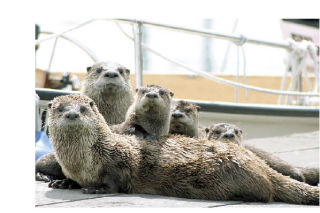Whidbey may be devoid of true rivers, but that hasn’t stopped river otters from proliferating on the island and all around Puget Sound.
The sleek, amphibious members of the weasel family are playful critters with strong family values and an undeniable adorableness. But there’s one characteristic of the animal that has caused consternation among some folks who’ve had to deal with them.
To put it simply, they stink. They produce a strong, disagreeable scent from their anal glands and they have especially smelly poop, perhaps from a diet of fish, crab and other sea creatures.
“Oh, the stench. It’s a stink you can’t believe,” said North Whidbey resident Joyce Hulett, who had to live with a family of otters under her home for a couple of months.
Mack Funk, the harbormaster at the Oak Harbor Marina, said a family of two adults and three young otters has taken up residence around the boats. He spent last Saturday cleaning otter feces off the docks, which he considers just a normal part of maintaining the marina.
But some boat owners aren’t so nonchalant about the creatures.
“If you have a boat that has otters climbing onboard and all around, it’s a big problem,” Funk said. “They can leave a big mess.”
Jack Anderson owns a 36-foot Grand Banks moored at the marina. He’s not too happy with the otters, but he’s good natured about the problems. “They own my boat,” he said.
Anderson explained that he put “a big, beautiful canvas” on his boat to protect it. The river otters found another use.
“I only gave them a habitat to crawl into,” he said. “They crawled into it and thought I was the greatest guy on earth.”
Funk discussed the otter situation with Fred Goodman, Oak Harbor’s own specialist for the USDA Wildlife Services. Goodman is helping Funk with a pigeon problem at the marina, but otters are an entirely different matter.
Goodman said otters seem to be doing very well in the Puget Sound region, which he guessed is due in part to the 2000 voter initiative making it a crime to capture animals with a steel-jawed leghold trap or other body-gripping traps. But since river otters aren’t a protected species, there’s still a season for trapping them by more humane methods.
Goodman said he sees otters with three or four pups, which is a good sign of a healthy population. He said otters live at every marina in the region since the docks and boats provide great shelter.
Dealing with otter problems, Goodman said, is usually simple: Find a way to keep them out.
“A lot of time it’s more of a people problem,” he said. “It’s a matter of educating people.”
It can be very simple, Goodman said, to keep river otters off of boats. Often the problem is solved by removing a step ladder. Or other barriers can be put up while a boat is in moorage.
Besides boats, Goodman said otters commonly cause olfactory problems by living under buildings, especially homes near the water. Again, Goodman said the solution is to “exclude” the animals from crawl spaces with fencing or sturdy screens on vent holes.
Hulett, a resident of Dugualla Bay Heights, said she first realized something alive was underneath her house when she heard a ripping sound below the floorboards. Fearing it was rats, she called a pest control professional who informed her that an otter was building a nest.
“I simply had to let her have her pups and wait,” she said, explaining that the crawl space was too small for a person to enter.
After producing the terrible odor for weeks, the youngsters finally grew big enough to leave the nest. Once they were gone, the area was sealed off.
“I don’t mind otters,” Hulett said, “I just wish they’d live somewhere else.”



